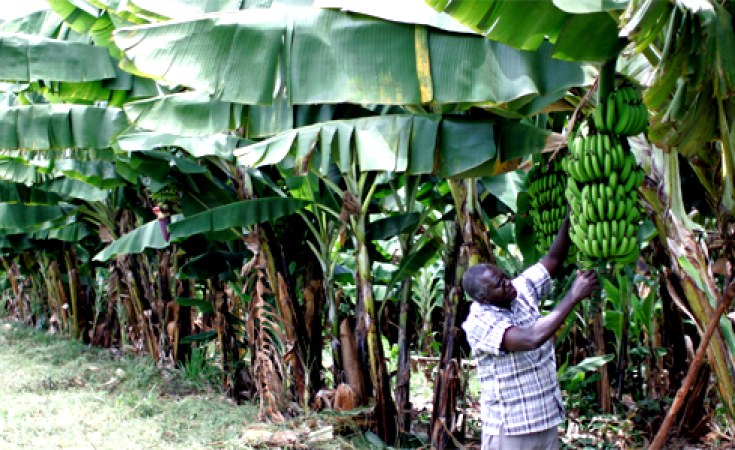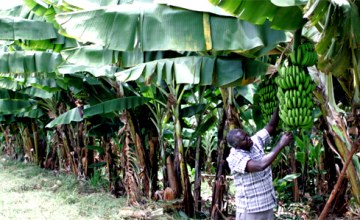Limited use of improved technology is a major reason for low agricultural productivity across Africa, the African Development Bank (AfDB) has said at the ongoing African Green Revolution Forum (AGRF) in Nairobi.
"Low use of technology is partly why Africa continues to be a net importer of food ," Chiji Ojukwu, the AfDB Director for Agriculture and Agro-Industry stated Tuesday, adding that over 60 percent of the continent's land has irrigation potential, yet only five percent of it is under irrigation.
Speaking at a session on "Agriculture Infrastructure, Technology and Mechanization," Ojukwu said it was impossible for Africa to be competitive while its farmers were still spending too much time tilling acres of land manually. "We cannot feed Africa with this kind of agriculture. We must mechanize. Mechanization of agriculture is imperative. Let us do what we can to push this agenda," he stressed.
Statistics from the AfDB indicate that African farmers have 10 times fewer mechanized implements per farm area than farmers in other developing regions and access has not grown as quickly as in other regions.
Nigeria has embarked on a pilot project to provide tractors and fertilizer to farmers with the aim of boosting agricultural production. Abdullahi Abubakar, the Deputy Director for Engineering and Mechanization in the Federal Ministry of Agriculture and Rural Development, said his department has partnered with Agricultural Equipment Hiring Enterprises (AEHEs), and is currently working with 110 centres to provide services to smallholder farmers. "Mechanization makes the farmer more efficient, displacing unskilled labour and allowing the farmer to till a large parcel of land over a short time," he said.
The African Green Revolution Forum saw the AfDB reiterate its commitment to supporting its regional member countries to create AEHEs, as well as providing concessional debts to be on-lent for equipment hiring and purchasing through commercial banks.
But most important, as with mechanization, is solving Africa's water problem. Experts say the continent is facing diminishing water supplies, thus making irrigation a challenge. According to the World Bank, water scarcity can translate into growth-rates decline as much as 6 percent of GDP by 2050 as a result of water-related losses in agriculture, among others.
"Mechanization starts with water management," said Patrick Nduati Mwangi, Principal Secretary in Kenya's Ministry of Water and Irrigation. He cited the Government's efforts to irrigate a 10,000-acre model farm in the arid coastal region in order to boost food security.
The use of Information and communications technology (ICT) was mentioned as pertinent to Africa's agricultural transformation, and is seen as a tool to woo the youth into entrepreneurship in agriculture ('agri-preneurship'). "The youth are not finding agriculture interesting because there is a gap which needs to be filled by information. The youth can bridge this gap by utilizing applications that provide information on farming methods, disease control, soil improvement technologies and market opportunities," Gift Mafuleke, a youth farmer from South Africa, told delegates.
Already the AfDB is rolling out its ENABLE (Empowering Novel Agri-Business Led Employment) Youth initiative, in partnership with the International Institute of Tropical Agriculture. The program seeks to bolster youth entrepreneurship in agriculture and agri-business. The initiative will see the Bank train the next generation of agriculture entrepreneurs, also referred to as 'agri-preneurs', in several countries, and provide them with seed money through banks to finance their bankable business plans.
ENABLE Youth is also seen as an innovative initiative to address youth unemployment through agriculture. The initiative, under Feed Africa, the Bank's Strategy for African Agricultural Transformation during the period 2016-2025, will embark on a number of approaches aimed at responding to the challenges of technology and mechanization.
These include: increasing investment to disseminate proven technologies for agricultural productivity improvement through the Technologies for African Agricultural Transformation initiative (TAAT); establishing a facility for on-farm mechanization leasing; investing in infrastructure and training to reduce on-farm and post-harvest losses; scaling-up and replicating innovative models to organize and aggregate farmers; accelerating and coordinating development of enabling hard infrastructure (energy, water, and logistics); building market centers and associated service infrastructure; and launching large scale farmer e-registration systems.



